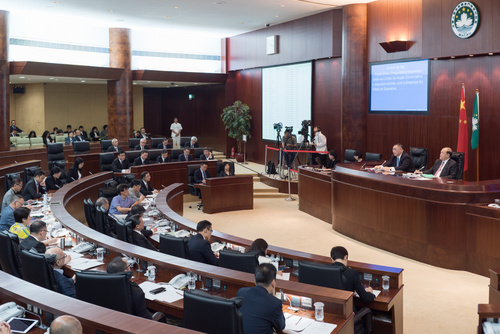 The Chief Executive, Mr Chui Sai On, takes legislators’ questions on Government policy and social issues during a plenary session of the Legislative Assembly.
The Chief Executive, Mr Chui Sai On, takes legislators’ questions on Government policy and social issues during a plenary session of the Legislative Assembly.
The Chief Executive, Mr Chui Sai On, today said at a plenary session of the Legislative Assembly that the Government is dedicated to identifying more plots of land for public housing projects.
Mr Chui stressed that plots in Avenida Wai Long in Taipa that had reverted to the Government would be used for public housing. The Government has initiated planning for housing projects in Taipa.
He was confident that, via the Government’s continued efforts, there would be further opportunities for the current administration to initiate new rounds of application – by local residents – for public housing units.
The Government is steadfast in the policy vision of “Homes for all in a contented society”, while pushing forward with the creation of a long-term mechanism on housing, added Mr Chui.
During today’s session, the Chief Executive gave an update on the reclamation process of the five plots in the new urban reclamation areas. Eighty percent of the reclamation work in Zone A had been done, with the balance likely to be completed by year-end. The delay to Zone A, located next to the reservoir on Macao peninsula, was partly related to the development of the Hong Kong-Zhuhai-Macao Bridge. The Government is stepping up planning processes regarding Zone A, which is to include a total of 28,000 public housing units.
Reclamation work in Zone B – located on Macao Peninsula – has been completed; planning for Zone C, connected to Taipa Island, would be completed this year. The Government would initiate a tender process – in the second quarter this year – for reclamation construction in Zone D, which also linked to Taipa. Reclamation work in Zone E, also connected to Taipa Island, would be completed this year.
In addition, Mr Chui noted the Government had previously nullified 38 land concessions in cases where leaseholders failed to develop the land according to the timetable and terms stated by the Government. The Government further noted that recovery of some of the plots concerned were still subject to administrative and judicial procedures, said Mr Chui.
Mr Chui disclosed that the Government’s full report on the demand for public housing would be released in September. The report – covering topics including the possibility of a new category of public housing, e.g., dormitories for local young people – is to serve as a reference point for the Government when formulating long-term public housing policy.
Meanwhile, the Government is analysing the opinions received – via a public consultation in 2014 – on Macao’s Home-Ownership Scheme Housing Law.
Regarding the possibility of new Macao-Taipa vehicle crossing points, Mr Chui said the Government’s preliminary plan was to build two underwater tunnels adjacent to the Governor Nobre de Carvalho Bridge, and connecting Zones B, C and D. The Government had identified three other possible locations for such crossings and had commissioned a feasibility study from a research agency. The report was due to be finished by the third quarter of 2017.
Regarding a future use of the current Macao (Yat Yuen) Canidrome site, Mr Chui said it would be for public benefit, not for private residential projects or other commercial purposes.
Mr Chui said a public consultation on a revision to the Labour Relations Law would be held from 25 September to 8 November. Revision proposals included: increasing paternity leave to between three and five working days; and solving the issue of the overlap between weekly days-off and statutory holidays.
The Government would launch in September a public consultation regarding the establishment of a municipal organisation that is not an organ of political power.
During Friday’s afternoon session at the Legislative Assembly, Mr Chui answered a total of 29 questions from Legislative Assembly members. The enquiries covered several subjects including: Macao’s ageing population and its services for the elderly; issues relating to the Pearl Horizon housing development; housing policy; sport for all; tourism development in old neighbourhoods; talent development; welfare of civil servants; recruitment of public servants; accountability of senior officials; the healthcare system; and management of land resources.


